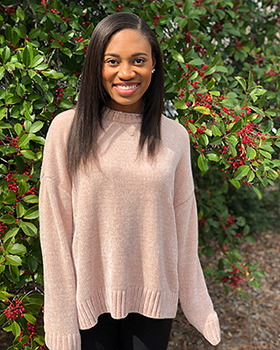 Meet Jenah Freeman, a Senior Psychology major with a minor in Neuroscience. She is currently working in Dr. Keely Muscatell’s Social Neuroscience and Health Lab where she is involved in a study which examines how physiological changes happening below the threshold of sensation relate to perceptions of social stimuli. To induce physiological changes, ear clips are attached to the participants’ ears, which are stimulated below the threshold of perception. During stimulation, participants complete several questionnaires and computer-based tasks. Jenah and the Lab also collect physiological data such as cortisol, EKG and cardiac impedance.
Meet Jenah Freeman, a Senior Psychology major with a minor in Neuroscience. She is currently working in Dr. Keely Muscatell’s Social Neuroscience and Health Lab where she is involved in a study which examines how physiological changes happening below the threshold of sensation relate to perceptions of social stimuli. To induce physiological changes, ear clips are attached to the participants’ ears, which are stimulated below the threshold of perception. During stimulation, participants complete several questionnaires and computer-based tasks. Jenah and the Lab also collect physiological data such as cortisol, EKG and cardiac impedance.
What encouraged you to get involved in research? One of the very first ideas drilled into my head by advisors was that I have to get involved in research. However, coming in as a transfer student and deciding that I would not stay the extra year, I did not think I would have the time to get involved in research or do many of the things I wanted to do here at Carolina before my time was up. I was sitting in the Pit one day last spring semester when I came across the website of a professor here at Carolina conducting research and I briefly read through the studies he was conducting. This then led to me to UNC’s psychology website where I indulged in reading through a few more lab’s websites and their studies. I decided to just go for it and stop making the excuse that I did not have enough time. So, I sent emails, filled out applications, and then I waited. Maybe it was luck or maybe I was meant to be in a lab, because I started getting emails and phone calls back and, after it all, I found a lab where I feel welcome and appreciated for every little thing that I do. My curiosity and interest really encouraged me to get involved in research it was just a matter of pushing myself to try something new and exciting.
What made you choose the Social Neuroscience and Health Lab? I have always taken an interest in social psychology and, after transferring to UNC and hearing there was a Neuroscience minor, I picked it up as well. I was fortunate enough to hear back from a few faculty offering me a place in their lab, but I was drawn to the Social Neuroscience and Health Lab in particular. Upon doing my research into laboratories, I visited their website and reviewed previous studies they had conducted regarding stress, economic inequalities, and health disparities as well as how stereotyping and discrimination affects health. I just knew this was the lab I wanted to be in. The way social psychology and neuroscience have been integrated and the various physiological responses people have to certain factors has just fascinated me throughout my experience thus far in the lab.
What do you like most about your work? I value the interest Dr. Muscatell and lab manager Samantha Brosso take in me as an undergraduate student in their lab. They both go out of their way to really make sure that the students in their lab are getting as much out of the experience as possible. We hold lab meetings each Wednesday where they provide updates of what is going on in the lab, have training sessions with the equipment, hold presentations about the research we are conducting, and they make sure that none of our questions go unanswered — whether that be about grad school or letting us know that taking a gap year is not a bad thing. By doing these things, my colleagues and I are able to learn and grow as students and researchers. I am more confident in my skills and abilities that I bring to the lab like using the devices that are a vital part to our study, because I am seen as an asset to the success of the study. In other words, I appreciate the trust and freedom that I am given in the lab because it makes me feel as if I am a contributor to something beyond me as opposed to a bystander who hears about it later.
Our Undergraduate Research Series features spotlights on our Psychology and Neuroscience majors and minors who are conducting undergraduate research with our faculty! We believe strongly that undergraduate experiences are greatly enriched by inquiry and discovery through undergraduate research. Research experiences allow students to better understand literature, determine areas of interest, discover their passion for research, continue on to graduate studies, and to jump start their careers as researchers. If you are an undergraduate who is interested in pursuing research experiences, we offer PSYC and NSCI 395 as an opportunity to work side-by-side with graduate students and faculty members on cutting-edge psychological and neuroscience research. We also recommend you visit the Office for Undergraduate Research to find research opportunities, apply for research funding, and for helpful tools and advice. Research opportunities abound at UNC – find one that works for you!

